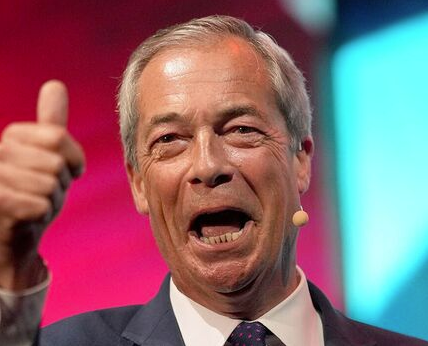
Nigel Farage’s party is proving that it is nothing like the two main parties. (Image: PA)
It’s been some time since Kemi Badenoch assumed the leadership of the Conservative Party, but one thing is crystal clear — this is more of the same. In a recent statement, Badenoch declared she would not support leaving the European Convention on Human Rights (ECHR), citing fears of splitting the party. When will the Conservatives start prioritising the country over their fragile party unity?
This pattern of self-preservation over bold, meaningful action has become the hallmark of a party in terminal decline. James Cleverly, who once seemed poised for Conservative leadership, now languishes on the back benches, having let his ambitions slip away due to overconfidence and a lack of focus.
But perhaps his retreat will give him time to address his glaring absence in his constituency. After nearly a decade, one wonders whether he will finally begin holding surgeries to hear from the constituents he’s long neglected.
More curious still is Cleverly’s sudden concern about the use of Wethersfield airbase to house illegal immigrants. Just months ago, as Home Secretary, Cleverly had the power to intervene — but he did nothing. Now, stripped of his position, he plays the concerned local MP, raising questions about his sincerity and commitment.
The Conservative Party increasingly looks like a relic of the past, clinging to life while the country moves on. After 14 years of failure, scandal, and division, it’s hard to see how this tired, fractured party can regain the public’s trust.
The root of their problem lies in their fundamental inability to govern cohesively. The so-called “One Nation” faction obstructs any real conservative policies, while the right wing of the party refuses to back left-leaning compromises. This toxic standoff ensures that no meaningful progress can be made on the pressing issues facing the UK.
It’s no wonder the party received a thrashing at the last general election. Yet, bafflingly, Conservative MPs seem utterly incapable of understanding why.
Unsurprisingly, some of the party’s most effective figures have had enough. High-profile defections to Reform UK speak volumes about the Conservative Party’s demise. Richard Murphy, a former National Head of Field Campaigning for CCHQ, recently defected after 30 years of service.
Tim Montgomerie, once a trusted adviser to Boris Johnson and the founder of Conservative Home, joined Reform UK after more than three decades as a staunch Tory.
And now, in a seismic shift, property tycoon Nick Candy has added his name to this growing list of defectors. Candy, a high-profile donor and long-time supporter of the Conservatives, announced his allegiance to Reform UK, citing his disillusionment with the party’s failures.
His defection sends shockwaves through the establishment, not only as a financial blow to the Conservatives but as a clear sign that Reform UK is becoming the home for those who believe in real change.
These defections highlight the growing appeal of Reform UK, a party unafraid to embrace bold policies and stand up for real conservative values. As the Conservatives sputter on, it’s clear that the right-of-centre political space remains fractured. Until this rift is reconciled, the prospect of a united, victorious government will remain elusive.
Reform UK represents the bold, fresh leadership Britain needs, while the Conservatives are stuck in an endless cycle of infighting and mediocrity.
How much longer will the country tolerate this dying party? Britain deserves better, and the writing is on the wall — the Conservatives’ days are numbered. The future belongs to those with the courage to act, and Reform UK is ready to lead.
Richard Thomson served as a Royal Marine for eight years and was the Reform UK candidate for Braintree in the 2024 General Election
